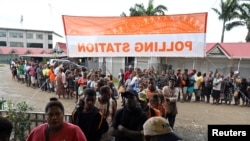Polls closed Wednesday in the Solomon Islands where elections for the country’s next government were being watched for potential regional impacts given the country’s relationship with China.
Jasper Highwood Anisi, the head of the Solomon Islands Election Commission, said at a news conference that the polling took place as planned across the country, and that many polling places saw lines of voters early in the day compared to previous elections that included more late voters.
Vote-counting was due to begin Thursday, with results not expected for several weeks. The election featured more than 1,000 polling places spread across the nation’s 900 islands.
Fifty lawmakers will be elected from 334 candidates, of which only 21 are women. Those 50 newly elected officials will then determine the prime minister.
The election is the first in the country since the government switched diplomatic ties from Taiwan to Beijing.
In addition to relations with China, opposition parties said voters would be focused on addressing health care, education and the country’s road network.
The election was supposed to take place last year but was delayed by Prime Minister Manasseh Sogavare, who argued that the country could not afford to hold the poll and host the regional Pacific Games in the same year. Critics of Sogavare have called this decision a power grab. He is the front-runner for an unprecedented second term.
China is also a concern in the election because of its growing security presence in the Pacific.
“The results will determine whether the Solomon Islands continues growing its relationship with China or changes course in favor of a different approach,” Parker Novak, a nonresident fellow at the Atlantic Council's Global China Hub, told VOA in a written response.
Reporter William Yang contributed to this report, which includes some information from The Associated Press.





